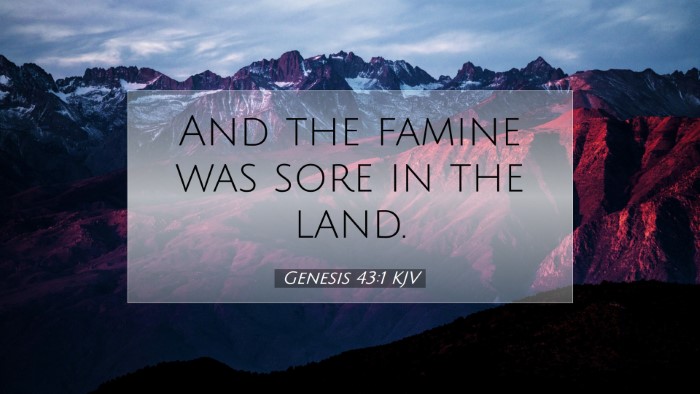Commentary on Genesis 43:1
Genesis 43:1 states: “Now the famine was severe in the land.” This verse serves as a pivotal moment in the narrative of Joseph and his brothers, shedding light on the severity of their circumstances. The commentators provide rich insights that dive deep into the implications of this situation, reflecting on themes of providence, family dynamics, and divine intervention.
Historical Context
Matthew Henry emphasizes the significance of the famine that prompted subsequent actions from Jacob and his sons. The famine not only highlights the dire conditions faced by the people of Canaan but also serves as a divine instrument that God uses to bring Jacob's family to a point of reckoning. In stark contrast to their previous actions, the famine forces them into a situation wherein they must confront their past sins regarding Joseph.
Theological Insights
Albert Barnes notes that the famine signifies a broader theological truth—the hand of God at work both in judgment and restoration. While the famine is a form of divine judgment, it also prompts a progression towards redemption. Jacob's family is brought to need and reliance, which ultimately leads them back to the very brother they had wronged.
Divine Providence
Adam Clarke focuses on the aspect of divine providence evident in this narrative. The famine is not merely a natural occurrence but a sovereign act orchestrated by God to achieve His purposes. Clarke talks about how the adversity faced serves as a catalyst for spiritual and relational restoration among the family, pointing out that crises can lead to repentance and reconciliation.
Character Analysis
Jacob’s Leadership
In response to the famine, Jacob's role as a father is crucial. Matthew Henry posits that Jacob's reluctance to send Benjamin back to Egypt reflects both his protective instincts and a lack of faith. This reluctance showcases the struggle between fear and faith that many believers face during trials.
The Brothers’ Response
The brothers' returning to Egypt symbolizes the movement from denial to acceptance. Albert Barnes points out their previous cowardice contrasted with their eventual decision to face Joseph. This turnaround illustrates a narrative arc of growth and change, indicating that desperation can lead to courage when one is compelled to take necessary action.
Applications for Today
The verse encourages reflection on the dynamics of family, repentance, and the means through which God moves in our lives. Adam Clarke suggests that in our own times of spiritual famine, we must be willing to confront our failures and seek restoration. The application of this biblical narrative goes beyond historical context and speaks to the present-day experiences of believers.
Seeking God in Times of Trouble
As believers encounter their own 'famine' moments—whether spiritual dryness, relational discord, or financial distress—this verse invites them to look for God’s providential hand. The example set by Jacob and his sons serves as a reminder that acknowledging our needs can lead us back to our true source of provision: God Himself.
Conclusion
Genesis 43:1 encapsulates a profound moment in the life of Jacob’s family marked by hardship and the subsequent need for divine intervention. The insights provided by Matthew Henry, Albert Barnes, and Adam Clarke invite deeper contemplation of how physical and spiritual famines push individuals towards faith, reliance, and ultimately, restoration. Pastors, scholars, and students of the Bible can draw numerous applications from this verse, recognizing that through hardship, God can orchestrate a plan of redemption that brings families closer to one another and back to Himself.


